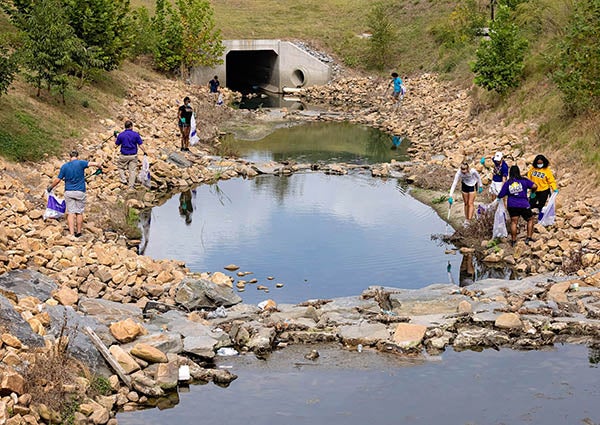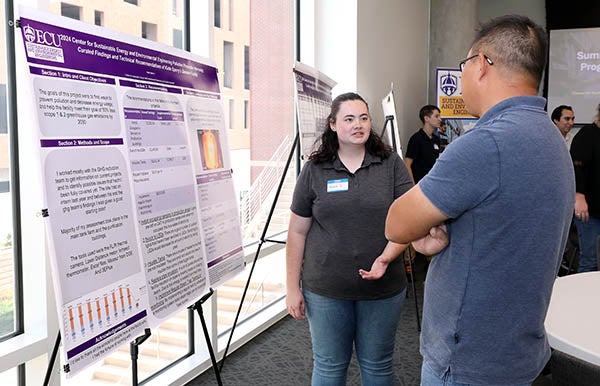ECU marks Pollution Prevention Week
East Carolina University is marking Pollution Prevention Week with activities while highlighting efforts on campus as well as with partners off campus to save energy and reduce costs.
ECU Sustainability has scheduled a screening of the film “The Human Element” at 6 p.m. Thursday in the Main Campus Student Center Black Box Theatre. Created by photographer and explorer James Balog, the film explores the effects of climate on everyday Americans. A discussion is planned after the screening.

ECU volunteers pick up trash along Town Creek Culvert near First Street in Greenville. Another cleanup is scheduled from 3-4 p.m. Sept. 24 as part of Pollution Prevention Week. (Photo by Cliff Hollis)
ECU students, staff and faculty can volunteer for a Litter Cleanup from 3-4 p.m. Sept. 24 at Town Creek Culvert in Greenville. Volunteers are asked to register online and wear boots or old shoes they don’t mind getting dirty. Gloves, bags and pickers will be provided.
Dr. Ranjeet Agarwala, associate professor in the Department of Technology Systems, plans a demonstration of non-polluting technologies from 10-11 a.m. Wednesday outside the Science and Technology Building.
The Center for Sustainable Energy and Environmental Engineering (CSE3) will have a table display in the atrium of the Science and Technology Building from 1-3 p.m. Monday and 10 a.m. to noon Tuesday. They’ll be in the Main Campus Student Center from 1-3 p.m. on Friday.
The center, housed in the College of Engineering and Technology, aims to provide scholarly, applied research and consultancy for sustainable energy development and conservation of natural resources. The center has 24 faculty members working on 12 projects and features a variety of webinars and workshops designed to help businesses, organizations and industries reduce energy use and pollution.
The center recently celebrated its industry partners and student interns involved a unique program designed to help companies prevent pollution and reduce energy consumption. A $350,000 grant from the Environmental Protection Agency has funded 13 students to work at area manufacturing plants during the past two summers.
Sukhman Sandhu, a senior engineering major from Greensboro, worked with Hyster-Yale in Greenville, exploring energy reduction in everything from lighting and window tinting to large air compressors. He said he wanted to make sure he did a good job for the company.
“I really liked it,” he said. “I was worried I wasn’t going to be able to do it to the best of my ability, but I just kept going. I kept working and it ended pretty well. I would have felt bad if I wasn’t able to produce what they wanted.”
At the end of the internship, he presented findings to company officials, something he looks forward to doing in his career upon graduation.
“I want to go into pollution consulting and air quality consulting,” Sandhu said. “This was sort of like that. It just confirmed that I do want to go into consulting or some sort of energy audits.”

Engineering student Katie Sperry talks about her pollution prevention internship during a luncheon and program for industry partners in the Main Campus Student Center. (Photo by Ken Buday)
Hyster-Yale participated in the program for the second consecutive year. Stephen Kelly, environmental health and safety manager with Hyster-Yale in Greenville, said the internship program matches the company’s commitment to be good environmental stewards, adding the interns bring a lot to the table.
“Their education and the new technologies that they’re able to bring and the things they’ve been exposed to at ECU and using those thoughts on the practices that we’re already using at the plant, we’ve been able to capitalize on that and make significant improvements based on their research and being innovative with potential solutions,” Kelly said.
Katie Sperry, a junior from Raleigh, is studying electrical engineering at ECU but sees the importance of considering environmental impacts in that field.
“I really find these topics interesting,” said Sperry, who interned with Ajinomoto. “I’ve taken some environmental classes as tech electives, and there is a lot of overlap there. … There are a lot of companies in North Carolina that understand that overlap, and I’m looking to work for one of them when I graduate.”
Dr. Tarek Abdel-Salam, engineering professor and CSE3 director, said the goal is to stop pollution before it starts.
“Our project is about preventing pollution at the source,” he said. “For example, once you have pollution in the water — metals or chemicals or things like that — it’s done. It’s over. We’re trying not to pollute the water from the source.”
ECU is a proponent of that philosophy. As an example, the university uses building automation systems that adjust HVAC equipment to shut down or run at reduced capacities when buildings are unoccupied. During July and August, electrical energy savings on buildings with the automated systems ranged from 5% to 27%, according to Energy Manager Sammy Snead.
Snead said other projects are helping to reduce the use of steam in campus buildings, thus decreasing the university’s consumption of natural gas at ECU’s steam plants. The university is also replacing older heat pumps and air conditioning units with more efficient ones that will reduce energy use.
ECU is a member of the U.S. Green Building Council — a nonprofit organization that promotes sustainability in building design, construction and operation — and focuses on Leadership in Energy and Environmental Design (LEED) practices that are designed to conserve energy and water as well as reduce waste sent to landfills.
ECU has received Tree Campus USA and Bee Campus USA designations, and has been named a Bicycle Friendly University by the League of American Bicyclists.